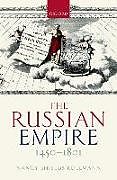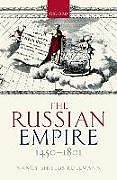The Russian Empire 1450-1801
Einband:
Fester Einband
EAN:
9780199280513
Untertitel:
Englisch
Genre:
Geschichte
Autor:
Nancy Shields Kollmann
Herausgeber:
Oxford Academic
Anzahl Seiten:
512
Erscheinungsdatum:
19.01.2017
ISBN:
978-0-19-928051-3
Zusatztext this masterpiece will accompany us for years to come. It is a gift given to the entire spectrum of people engaging with Russian history â from the public to the specialists â by a scholar most intimately with the sources as well as the scholarship. Informationen zum Autor Nancy Kollmann has taught early modern Russian history at Stanford University since 1982. Her research has focused on the problem of how politics worked in an autocratic state; she has studied how the great men of the Moscow court received and enhanced their political positions through marriage and kinship, how the tsar's government supported litigations over personal honor for all social groups as a means of social integration and how criminal law was applied inpractice. She has also focused on the image of Russia conveyed to Europeans in contemporary engravings, maps, and books. Klappentext Russia's imperial past has shaped modern Russian identity and historical experience. The Russian Empire 1450-1801 surveys the empire's emergence and governance, exploring how the state maintained control of defense, criminal law, taxation, and mobilization of resources, while tolerating local religions, languages, cultures, and institutions. Zusammenfassung Russia's imperial past has shaped modern Russian identity and historical experience. The Russian Empire 1450-1801 surveys the empire's emergence and governance, exploring how the state maintained control of defense, criminal law, taxation, and mobilization of resources, while tolerating local religions, languages, cultures, and institutions.
Autorentext
Nancy Kollmann has taught early modern Russian history at Stanford University since 1982. Her research has focused on the problem of how politics worked in an autocratic state; she has studied how the great men of the Moscow court received and enhanced their political positions through marriage and kinship, how the tsar's government supported litigations over personal honor for all social groups as a means of social integration and how criminal law was applied in practice. She has also focused on the image of Russia conveyed to Europeans in contemporary engravings, maps, and books.
Klappentext
Russia's imperial past has shaped modern Russian identity and historical experience. The Russian Empire 1450-1801 surveys the empire's emergence and governance, exploring how the state maintained control of defense, criminal law, taxation, and mobilization of resources, while tolerating local religions, languages, cultures, and institutions.
Zusammenfassung
Modern Russian identity and historical experience has been largely shaped by Russia's imperial past: an empire that was founded in the early modern era and endures in large part today. The Russian Empire 1450-1801 surveys how the areas that made up the empire were conquered and how they were governed. It considers the Russian empire a 'Eurasian empire', characterized by a 'politics of difference': the rulers and their elites at the center defined the state's needs minimally - with control over defense, criminal law, taxation, and mobilization of resources - and otherwise tolerated local religions, languages, cultures, elites, and institutions. The center related to communities and religions vertically, according each a modicum of rights and autonomies, but didn't allow horizontal connections across nobilities, townsmen, or other groups potentially with common interests to coalesce. Thus, the Russian empire was multi-ethnic and multi-religious; Nancy Kollmann gives detailed attention to the major ethnic and religious groups, and surveys the government's strategies of governance - centralized bureaucracy, military reform, and a changed judicial system. The volume pays particular attention to the dissemination of a supranational ideology of political legitimacy in a variety of media - written sources and primarily public ritual, painting, and particularly architecture. Beginning with foundational features, such as geography, climate, demography, and geopolitical situation, The Russian Empire 1450-1801 explores the empire's primarily agrarian economy, serfdom, towns and trade, as well as the many religious groups - primarily Orthodoxy, Islam, and Buddhism. It tracks the emergence of an 'Imperial nobility' and a national self-consciousness that was, by the end of the eighteenth century, distinctly imperial, embracing the diversity of the empire's many peoples and cultures.

Leider konnten wir für diesen Artikel keine Preise ermitteln ...
billigbuch.ch sucht jetzt für Sie die besten Angebote ...
Die aktuellen Verkaufspreise von 6 Onlineshops werden in Realtime abgefragt.
Sie können das gewünschte Produkt anschliessend direkt beim Anbieter Ihrer Wahl bestellen.
Loading...
Die aktuellen Verkaufspreise von 6 Onlineshops werden in Realtime abgefragt.
Sie können das gewünschte Produkt anschliessend direkt beim Anbieter Ihrer Wahl bestellen.
| # | Onlineshop | Preis CHF | Versand CHF | Total CHF | ||
|---|---|---|---|---|---|---|
| 1 | Seller | 0.00 | 0.00 | 0.00 |
